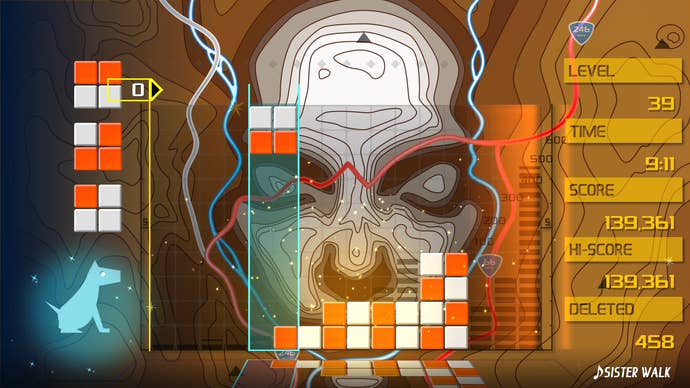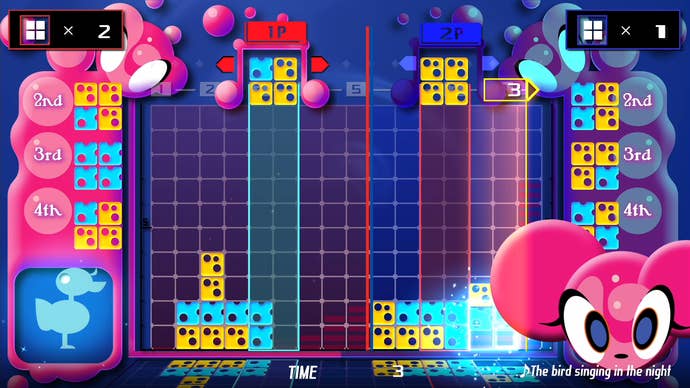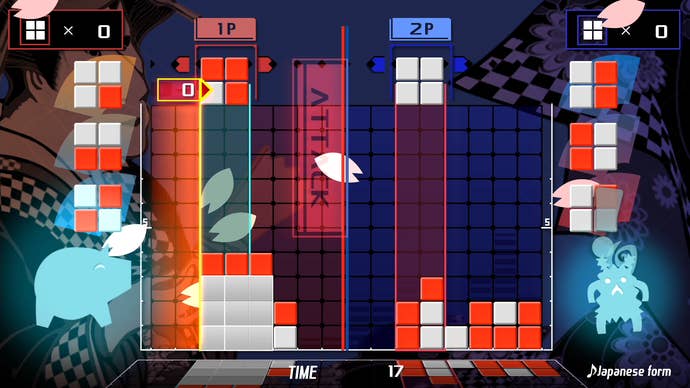Lumines Remastered Owes Its Existence to Nintendo Switch
Further cementing the system's reputation as the modern-day PSP and Vita replacement.
This article first appeared on USgamer, a partner publication of VG247. Some content, such as this article, has been migrated to VG247 for posterity after USgamer's closure - but it has not been edited or further vetted by the VG247 team.
The upcoming high-definition remake of Q Entertainment's Lumines made a public appearance recently at Kyoto's BitSummit festival. Originally debuting as a launch title for Sony's PlayStation Portable, Lumines Remastered put in its BitSummit appearance in Microsoft's booth as an Xbox One game. In truth, though, it more properly should have been on a Nintendo kiosk; after all, it was Nintendo Switch that prompted Lumines' return.
"I have always heard from original Lumines fans that they still want to play it in the way that they did," says Tetsuya Mizuguchi, referring to the close relationship between Lumines and the PSP hardware. As the former head of Q Entertainment and current president of Enhance Games, Mizuguchi has acted as producer on both versions of Lumines. "[Fans want to play] in way that's very familiar to them. But either they don't carry around and play games on their PSP anymore, or they don't have a PSP anymore and aren't going to buy a new one just to play Lumines."

Mizuguchi understands the desire to recapture the very specific feel of playing Lumines on PSP. After all, its genesis resulted from an effort to create a game specifically tailored for the hardware's capabilities—something unique, that previous consoles couldn't have delivered. Naturally, Mizuguchi turned to his love of music games for inspiration.
"During the PS2 era, there was really no easy way for you to plug in your headphones to a game and have a truly deep connection with the music element of a game," he recalls. "I felt that the power of music in games wasn't being expressed the way it should have been. The technology wasn't there. Because of the lack of intimacy of the audio output of a game, I think it's fair to say the audio experience of PS2 and Xbox wasn't all it should have been.
"When PSP came out, Sony positioned it as the new, interactive Walkman. You could basically take it anywhere and listen to music. That was a huge inspiration in coming up with the concept for Lumines. The handheld itself really pushed the concept, and I really wanted to focus on the audio-visual experience. While I had something like Rez in mind, when I was presented with the PSP I realized I could take it in a direction where you can have that audio-visual experience and it's not as intimidating [to casual players]."
Rather than playing as a shooter like Rez or a call-and-response rhythm title like Space Channel 5, Lumines fell more into the falling-block puzzler category popularized by Tetris. Lumines stood apart from its peers thanks to its emphasis on sound and music. Player actions were accompanied by audio effects that syncopated with the background music to create a distinct soundscape. Combined with the glossy visuals (which took advantage of PSP's bright, glossy screen) and a "timeline" that swept the field to clear blocks, Lumines bent genres of both gameplay and music.

According to composer Takayuki Nakamura, Lumines' subtitle ("Puzzle Fusion") applied to the game's music as much as to the game itself. "The style of Lumines' music was originally more techno or electronica, but I really see it more as ambient music," he says. "Normally music is defined by genres. If you change a part of the song, it changes the entirety of the song. Lumines' music isn't limited by that thought process.
"The flow of songs in Lumines has to feel good even if a part of it is missing. For instance, consider a rock song. If you lose the vocals, the feel of the song will be bad. But in Lumines, that kind of thing happens often when the player simply plays the game. The music changes. But even with those changes, it has to feel like a complete song."
While Nakamura isn't really involved with Lumines Remastered, he composed 40 of the game's 45 tracks. It appears all the tunes that originally appeared in the game will be returning, and as with the visuals and play options, the audio will be getting a quality boost for the new release. Or, more accurately, the audio will be restored to its original quality.
"All songs for the original Lumines were created on PC," Nakamura explains. "The PSP had a sample rate of 32KHz, but the songs were composed at a bit rate of 44Khz. So we'll simply be using the source tracks we created at the time—we don't need to remaster them."

While fans will likely welcome the opportunity to enjoy Lumines' soundtrack in full resolution, high-quality playback has been a standard feature on consoles for quite some time now. So why is the original Lumines only now making its comeback? Again, Mizuguchi credits the timing to Switch.
"I've told myself, if I were to bring back the original Lumines, there needs to be something new about it," he muses. "Maybe not in the form of content or music, but some sort of new element that would give me the opportunity to bring it back. When the Switch was announced and we were presented with HD rumble, I felt like it was the right time to see what we can do [with that feature] if we were to bring back the original Lumines."
Although the game's BitSummit demo didn't show off its HD rumble support (having appeared on Xbox One), Switch really does feel like a logical home for Lumines. Boasting its vivid screen set against a dark body in handheld mode, the Switch version should bring back memories of long sessions spent creating tunes and clearing blocks to millions of PSP enthusiasts. It's hard to say if Lumines itself will still have the same impact it did 13 years ago, but the high-resolution facelift and various quality-of-life tweaks Enhance has added to the remake across all platforms (such as multiplayer leaderboards) should help when the game launches June 26.
